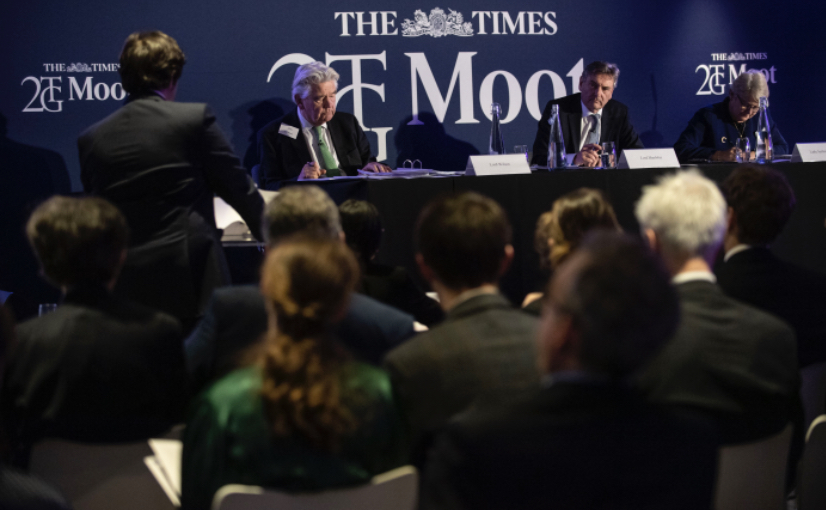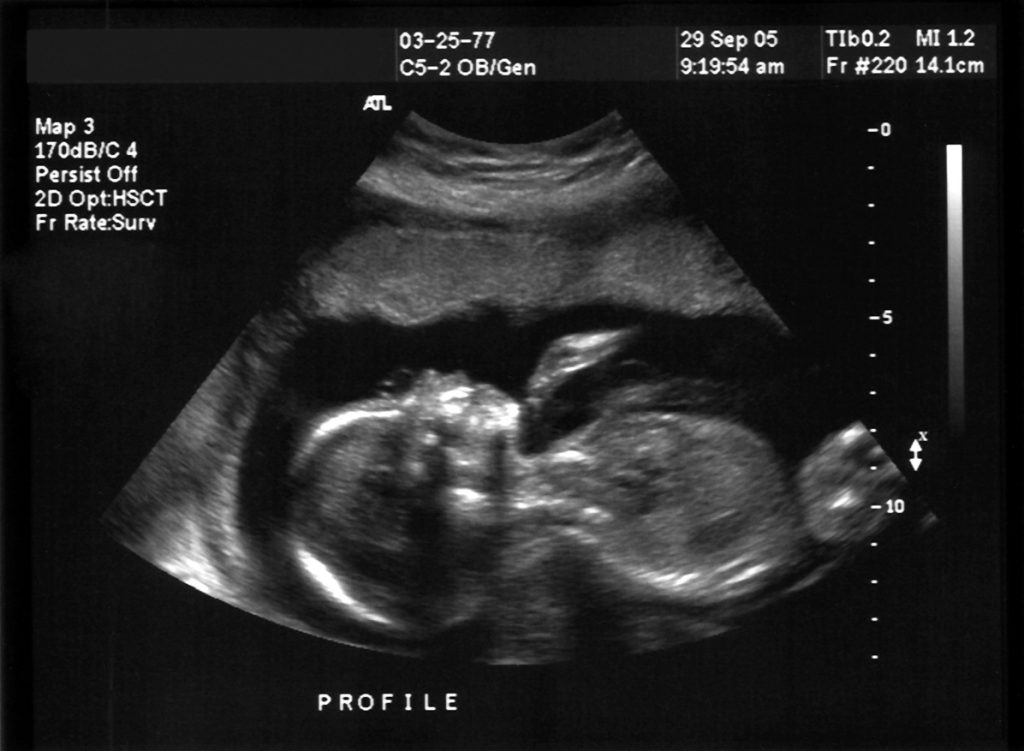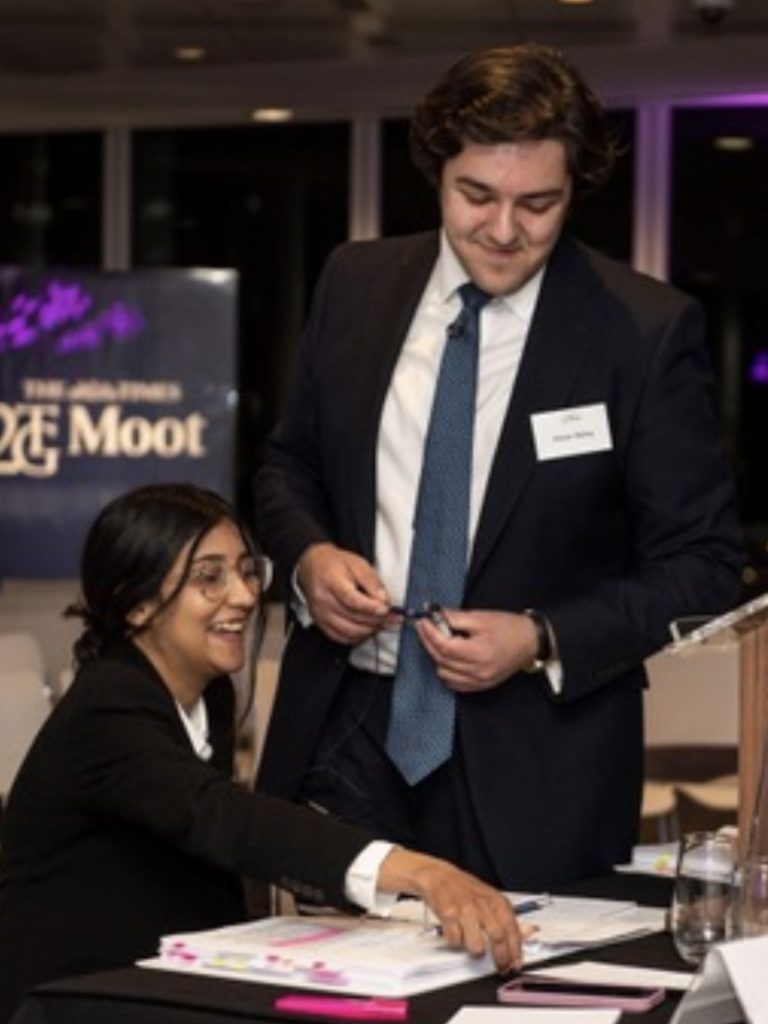Deadline looming for entering The Times 2TG Moot – here’s what happened last year…
Aurora Guerrini and Kieran Bailey competed at the Grand Final of the Times 2TG Moot on the 2nd February 2023, being judged by Lord Wilson, Lord Hamblen and Lady Justice Asplin. Here Kieran gives us a rundown of the Times 2TG experience…
We started this moot by submitting a skeleton argument; this ultimately was the only skeleton we would submit throughout the moot as the following rounds were oral only.
The first two rounds were based on tort law: vicarious liability and psychiatric harm topics. This started off in June 2022; the day after GDL exams ended, thus not much time for relaxation.
These first two rounds were enjoyable on the whole with an interesting factual matrix concerning a farm, a farmer and a race with motorbikes.
The quarter-final was similarly interesting but concerned a land law topic. There’s nothing wrong with land law but in general we concluded that one either loves it or doesn’t.
The more interesting legal analysis came with the semi-final. The moot problem here was based on the mid-20thc film noir picture, The Maltese Falcon (1941). Quality film that. Essentially, General Kemidov, in the moot problem, had induced a fella to buy what was ostensibly the priceless antique object, the Maltese Falcon, for $100 million, but when the fella went to collect his antique from the safety deposit box in Hatton Garden, he found a little rubber duck. A worthless object.
This case concerned the contract for the Maltese Falcon between General Kemidov and the fella who thought he was buying the real Maltese Falcon. The moot had two grounds of appeal and we were the Respondents. Kieran took the first ground, on contractual estoppel, and Aurora took the second ground, on the principle of reflective loss.

I focused on a clause in the contract, arguing that even if General Kemidov had made fraudulent representations to the fella buying the Falcon, nonetheless the contract which the parties entered into had made clear that whatever object was found in the safety deposit box satisfied the General’s part of the bargain. A clause in the contract stated that the fella buying the Falcon had had the opportunity to inspect the content of the deposit box and was satisfied (even though he hadn’t actually done that and instead signed the contract in haste to get his hands on the precious object and that).
This argument rested on a number of authorities which provided that where parties had agreed to an “extraordinary bargain”, and this certainly was one, the courts will not seek to better the bargain.
Aurora approached the issue of reflective loss, considering the question of whether or not a trustee was akin to a shareholder. It was an interesting and dynamic area for a cross appeal. The semi-final was held in the Royal Courts of Justice. Mrs Justice Heather Williams was our judge; she asked a number of probing questions. The austere setting made it feel even more important and was generally an exciting place to be.
We managed to persuade the judge that the contract was valid and essentially General Kemidov got to keep his $100 million whilst the Appellant was stuck with his little rubber duck. We advanced to the Final.

The Final was completely different. Firstly, the setting was different. The Final was held on the 17th floor of News UK, i.e. the Baby Shard. The Final was held in the evening affording an opportunity for excellent views. We could see the dome of St Pauls lit up, and the broader London skyline at night whilst arguing the relevant cases. An audience of 200 people filled the room, along with copious booze.
We had prepared for the Final for a few weeks. The judges in the final were Lord Wilson, Lord Hamblen and Asquith LJ. The Final concerned whether or not a mother should be able to claim maintenance payments from a hospital for an unwanted child in cases where she or her husband had been sterilised and the sterilisation procedure had failed.

The moot problem was basically this: the mother had gone to the doctor to be sterilised due to her concerns about overpopulation (she was also a vegan), the doctor had told her that she was fully sterilised after the procedure, and she proceeded to have unprotected sex during a steamy love affair with a fella at a conference in Brazil. Turns out, the doctor had failed to do his job properly, and she got pregnant. She then gave birth to a boy called Giles, but it turned out that she had a genetic condition such that Giles was born disabled. She and Giles settled in a commune in the Chiltern Hills. It also came to light that the mother had cancer and was only going to live for another ten years.
The questions arising then were whether or not the mother should be able to claim the maintenance costs of raising Giles from the NHS Trust and for how long, i.e. either for the duration of her life or for the duration of Giles’s life (he was predicted to live about 70 years with his disability).
We had to consider whether the current legal regime is correct or is in need of reform. The current approach stems from the cases of McKay, MacFarlane and Parkinson. The law at present is that a mother cannot claim for the maintenance costs of an unwanted child because the value of a human life is fundamentally incalculable; legal policy dictates that it would be morally offensive to seek to place a value on the life of a child.
However, following the Court of Appeal’s judgment in Parkinson, a parent can claim for the extra costs of raising an unwanted disabled child.

In the moot, one side (our side) had to argue that Parkinson was wrong and should be overruled. Submissions on this point included that Parkinson is morally offensive and diminishes the importance of the sanctity of life in legal policy, that Parkinson creates a legal incoherence with the law as set out in McKay and that Parkinson operates on the fundamental fiction that the doctor who failed to properly carry out the sterilisation procedure had contributed to the child being disabled.
The other side argued that Parkinson did not go far enough, and that MacFarlane was itself wrongly decided and mothers should be able to claim maintenance payments for the birth of any unwanted child following a failed sterilisation.
The second ground in the Final, concerned whether or not the NHS Trust should have to pay the extra costs for Giles’s disability (assuming Parkinson was not overruled) for the duration of the mother’s life or Giles’s life. Our side argued that ultimately the mother’s claim was for pure economic loss which she incurred during her life, and that if payments were made for Giles’s life this would effectively render Giles’s life as a “wrongful life” as opposed to a “wrongful birth”, which the courts as a matter of legal policy do not accept.
Lord Wilson raised an interesting point about whether or not it is significant that parents ultimately make provision for their children’s lives by inheritance and children can make claims under the Inheritance Act.
Ultimately, we managed to win which was great. A lot of fun overall. The irony perhaps, was that the first round of the moot had started about 9 months before the Final. 9 months of this moot in our lives, and the Final was about pregnancy. Funny that.
Thanks to Kieran for this comprehensive write-up of the Times 2TG Moot Competition and a massive congratulations to both him and Aurora on their victory. If you’ve been inspired by this, you have until 9th May 2023 to enter this year’s competition. Look at the competition website for full details of entry – you need to find yourself a moot partner.
